VU21631 Legal Process: Analyzing Higgins v Woodward [2017] VSCA 00
VerifiedAdded on 2023/01/24
|9
|1561
|38
Case Study
AI Summary
This case study presents an analysis of the legal proceedings in Constable Higgins v Woodward [2017] VSCA 00, focusing on an appeal by Constable Higgins regarding the arrest of Ross Woodward under the Summary Offences Act 1966 (Vic). The case revolves around whether Woodward was in a 'public place' (specifically, an annex to a caravan park) when he was arrested for being drunk and disorderly. The analysis includes the facts of the case, the charges under the Summary Offences Act (sections 13 and 14), the questions of law to be determined (primarily whether the annex constitutes a public place), and the arguments advanced by both the appellant (Higgins) and the respondent (Woodward). Key legal precedents such as Mansfield v Kelly; Langley v Bull and McKenzie v Stratton are referenced to support the arguments related to the definition and interpretation of 'public place'. The document concludes by outlining potential determinations on the questions of law and possible orders. Desklib provides access to similar case studies and solved assignments for students.

Legal process
Paraphrase This Document
Need a fresh take? Get an instant paraphrase of this document with our AI Paraphraser

Table of content
4
4
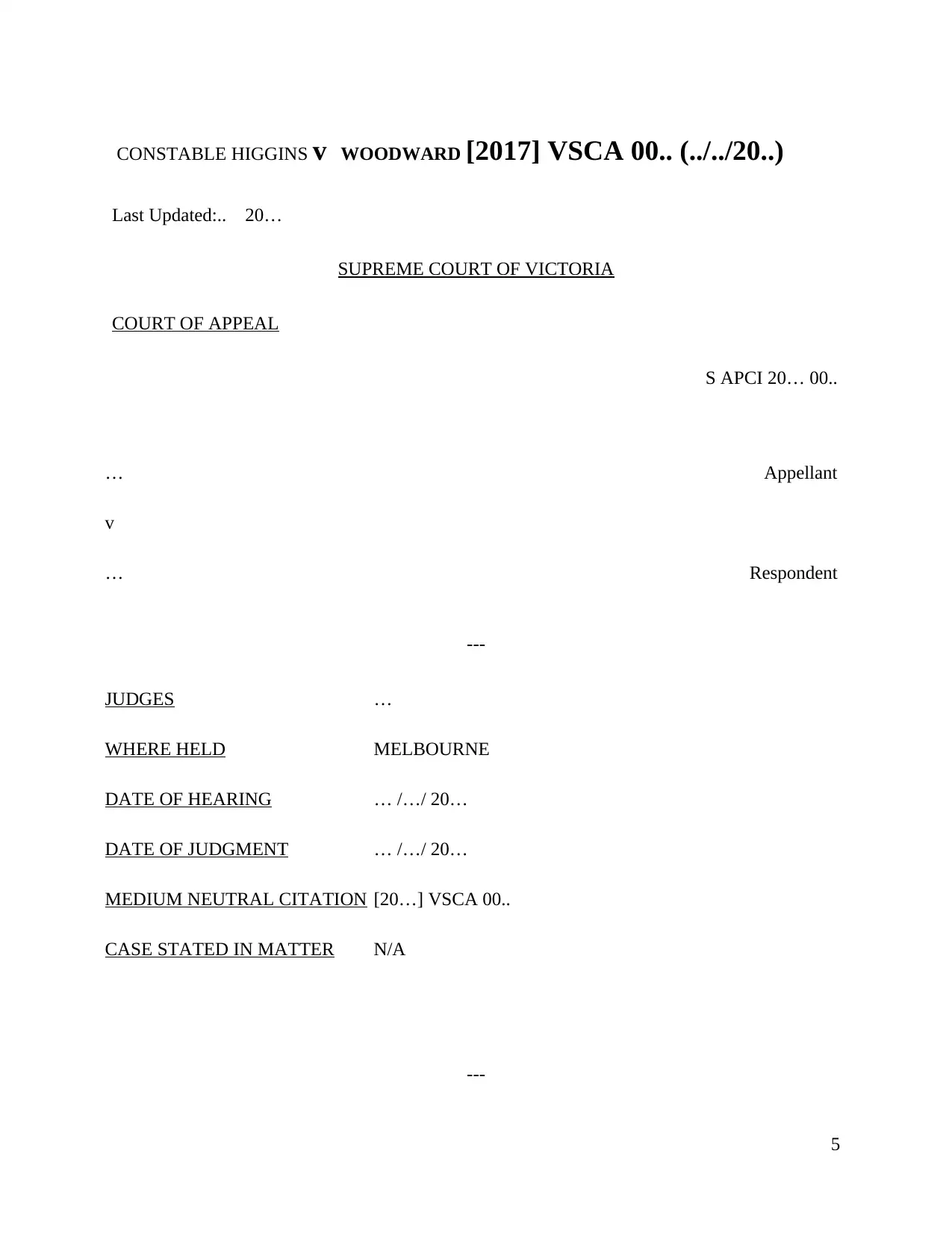
CONSTABLE HIGGINS v WOODWARD [2017] VSCA 00.. (../../20..)
Last Updated:.. 20…
SUPREME COURT OF VICTORIA
COURT OF APPEAL
S APCI 20… 00..
… Appellant
v
… Respondent
---
JUDGES …
WHERE HELD MELBOURNE
DATE OF HEARING … /…/ 20…
DATE OF JUDGMENT … /…/ 20…
MEDIUM NEUTRAL CITATION [20…] VSCA 00..
CASE STATED IN MATTER N/A
---
5
Last Updated:.. 20…
SUPREME COURT OF VICTORIA
COURT OF APPEAL
S APCI 20… 00..
… Appellant
v
… Respondent
---
JUDGES …
WHERE HELD MELBOURNE
DATE OF HEARING … /…/ 20…
DATE OF JUDGMENT … /…/ 20…
MEDIUM NEUTRAL CITATION [20…] VSCA 00..
CASE STATED IN MATTER N/A
---
5
⊘ This is a preview!⊘
Do you want full access?
Subscribe today to unlock all pages.

Trusted by 1+ million students worldwide
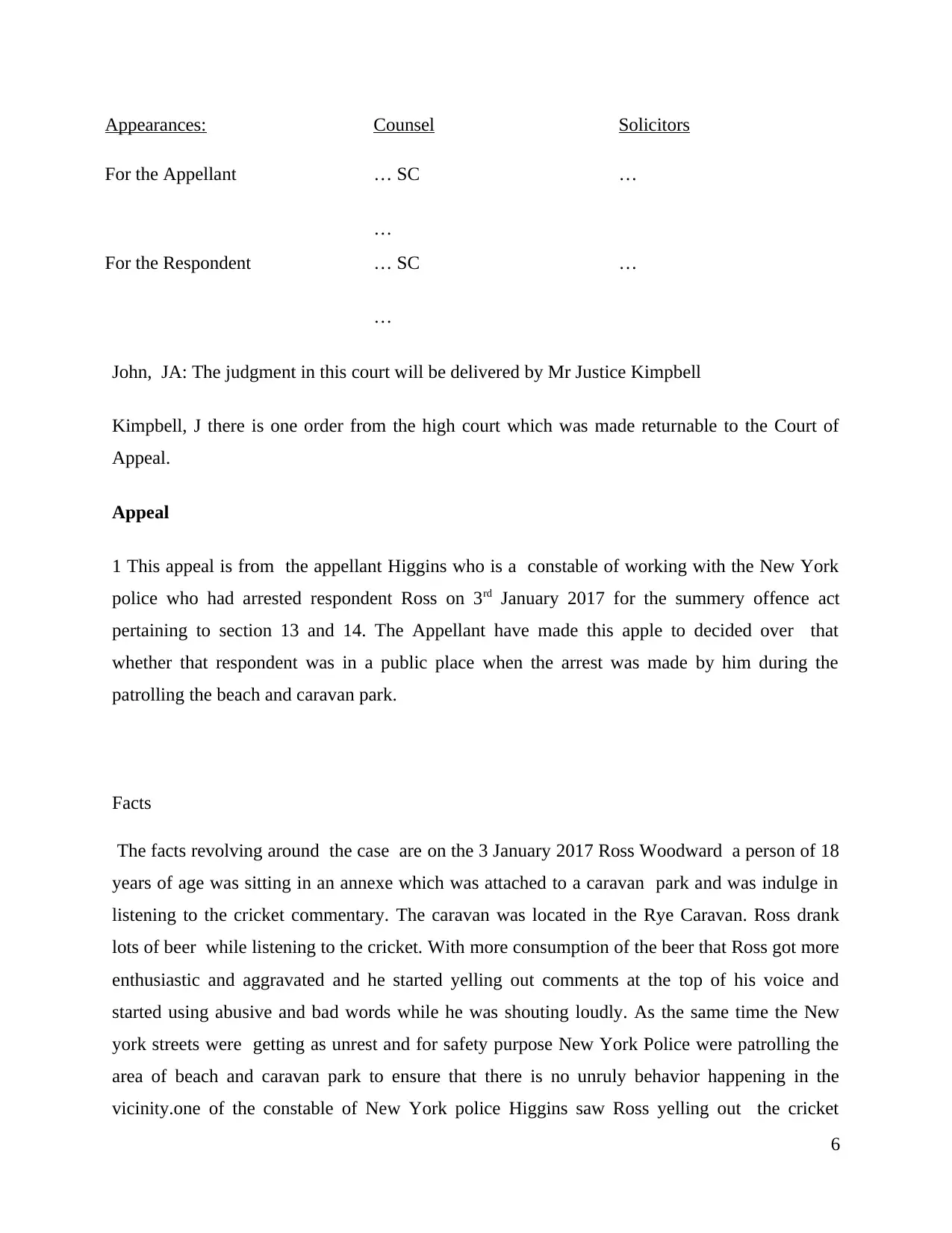
Appearances: Counsel Solicitors
For the Appellant … SC
…
…
For the Respondent … SC
…
…
John, JA: The judgment in this court will be delivered by Mr Justice Kimpbell
Kimpbell, J there is one order from the high court which was made returnable to the Court of
Appeal.
Appeal
1 This appeal is from the appellant Higgins who is a constable of working with the New York
police who had arrested respondent Ross on 3rd January 2017 for the summery offence act
pertaining to section 13 and 14. The Appellant have made this apple to decided over that
whether that respondent was in a public place when the arrest was made by him during the
patrolling the beach and caravan park.
Facts
The facts revolving around the case are on the 3 January 2017 Ross Woodward a person of 18
years of age was sitting in an annexe which was attached to a caravan park and was indulge in
listening to the cricket commentary. The caravan was located in the Rye Caravan. Ross drank
lots of beer while listening to the cricket. With more consumption of the beer that Ross got more
enthusiastic and aggravated and he started yelling out comments at the top of his voice and
started using abusive and bad words while he was shouting loudly. As the same time the New
york streets were getting as unrest and for safety purpose New York Police were patrolling the
area of beach and caravan park to ensure that there is no unruly behavior happening in the
vicinity.one of the constable of New York police Higgins saw Ross yelling out the cricket
6
For the Appellant … SC
…
…
For the Respondent … SC
…
…
John, JA: The judgment in this court will be delivered by Mr Justice Kimpbell
Kimpbell, J there is one order from the high court which was made returnable to the Court of
Appeal.
Appeal
1 This appeal is from the appellant Higgins who is a constable of working with the New York
police who had arrested respondent Ross on 3rd January 2017 for the summery offence act
pertaining to section 13 and 14. The Appellant have made this apple to decided over that
whether that respondent was in a public place when the arrest was made by him during the
patrolling the beach and caravan park.
Facts
The facts revolving around the case are on the 3 January 2017 Ross Woodward a person of 18
years of age was sitting in an annexe which was attached to a caravan park and was indulge in
listening to the cricket commentary. The caravan was located in the Rye Caravan. Ross drank
lots of beer while listening to the cricket. With more consumption of the beer that Ross got more
enthusiastic and aggravated and he started yelling out comments at the top of his voice and
started using abusive and bad words while he was shouting loudly. As the same time the New
york streets were getting as unrest and for safety purpose New York Police were patrolling the
area of beach and caravan park to ensure that there is no unruly behavior happening in the
vicinity.one of the constable of New York police Higgins saw Ross yelling out the cricket
6
Paraphrase This Document
Need a fresh take? Get an instant paraphrase of this document with our AI Paraphraser
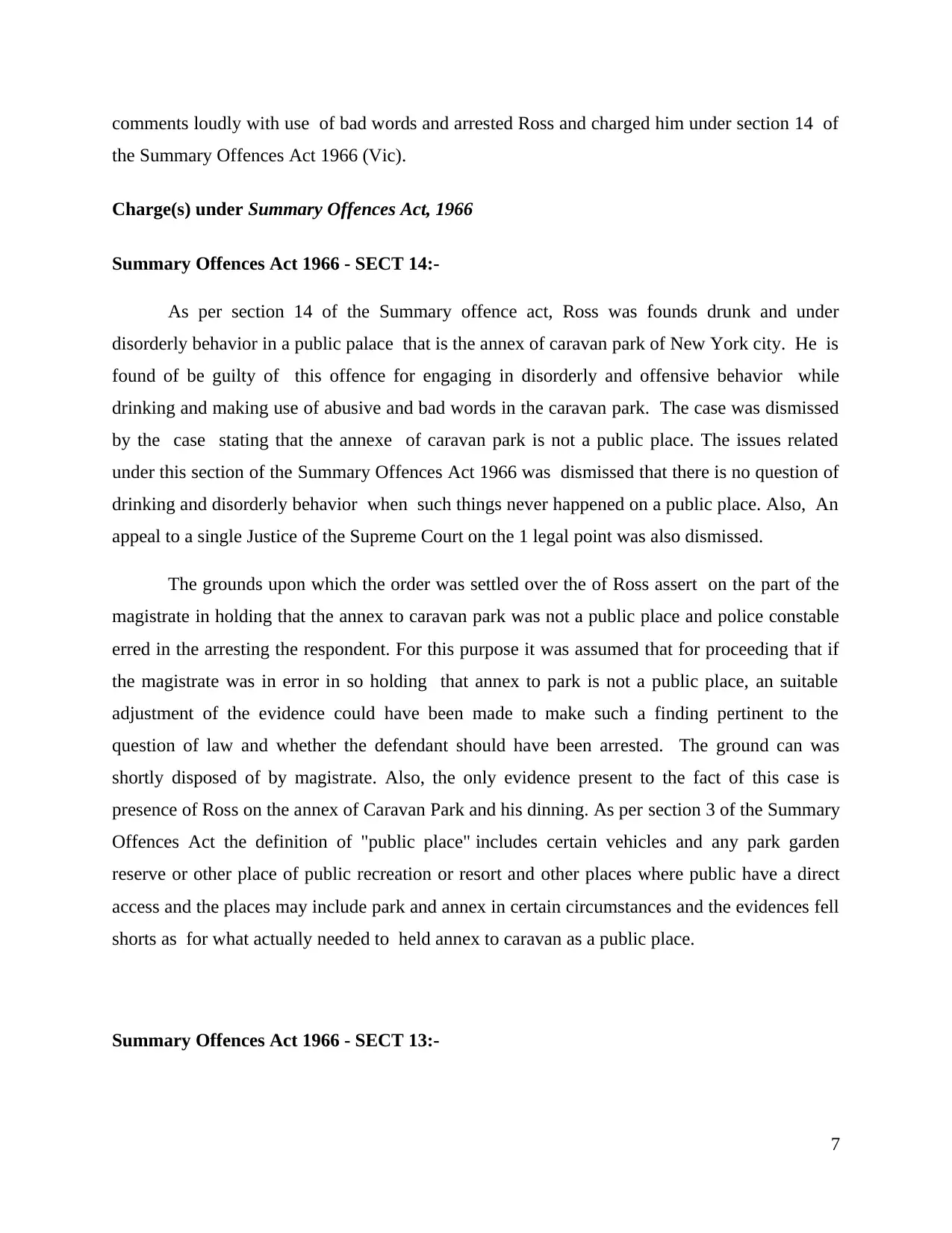
comments loudly with use of bad words and arrested Ross and charged him under section 14 of
the Summary Offences Act 1966 (Vic).
Charge(s) under Summary Offences Act, 1966
Summary Offences Act 1966 - SECT 14:-
As per section 14 of the Summary offence act, Ross was founds drunk and under
disorderly behavior in a public palace that is the annex of caravan park of New York city. He is
found of be guilty of this offence for engaging in disorderly and offensive behavior while
drinking and making use of abusive and bad words in the caravan park. The case was dismissed
by the case stating that the annexe of caravan park is not a public place. The issues related
under this section of the Summary Offences Act 1966 was dismissed that there is no question of
drinking and disorderly behavior when such things never happened on a public place. Also, An
appeal to a single Justice of the Supreme Court on the 1 legal point was also dismissed.
The grounds upon which the order was settled over the of Ross assert on the part of the
magistrate in holding that the annex to caravan park was not a public place and police constable
erred in the arresting the respondent. For this purpose it was assumed that for proceeding that if
the magistrate was in error in so holding that annex to park is not a public place, an suitable
adjustment of the evidence could have been made to make such a finding pertinent to the
question of law and whether the defendant should have been arrested. The ground can was
shortly disposed of by magistrate. Also, the only evidence present to the fact of this case is
presence of Ross on the annex of Caravan Park and his dinning. As per section 3 of the Summary
Offences Act the definition of "public place" includes certain vehicles and any park garden
reserve or other place of public recreation or resort and other places where public have a direct
access and the places may include park and annex in certain circumstances and the evidences fell
shorts as for what actually needed to held annex to caravan as a public place.
Summary Offences Act 1966 - SECT 13:-
7
the Summary Offences Act 1966 (Vic).
Charge(s) under Summary Offences Act, 1966
Summary Offences Act 1966 - SECT 14:-
As per section 14 of the Summary offence act, Ross was founds drunk and under
disorderly behavior in a public palace that is the annex of caravan park of New York city. He is
found of be guilty of this offence for engaging in disorderly and offensive behavior while
drinking and making use of abusive and bad words in the caravan park. The case was dismissed
by the case stating that the annexe of caravan park is not a public place. The issues related
under this section of the Summary Offences Act 1966 was dismissed that there is no question of
drinking and disorderly behavior when such things never happened on a public place. Also, An
appeal to a single Justice of the Supreme Court on the 1 legal point was also dismissed.
The grounds upon which the order was settled over the of Ross assert on the part of the
magistrate in holding that the annex to caravan park was not a public place and police constable
erred in the arresting the respondent. For this purpose it was assumed that for proceeding that if
the magistrate was in error in so holding that annex to park is not a public place, an suitable
adjustment of the evidence could have been made to make such a finding pertinent to the
question of law and whether the defendant should have been arrested. The ground can was
shortly disposed of by magistrate. Also, the only evidence present to the fact of this case is
presence of Ross on the annex of Caravan Park and his dinning. As per section 3 of the Summary
Offences Act the definition of "public place" includes certain vehicles and any park garden
reserve or other place of public recreation or resort and other places where public have a direct
access and the places may include park and annex in certain circumstances and the evidences fell
shorts as for what actually needed to held annex to caravan as a public place.
Summary Offences Act 1966 - SECT 13:-
7
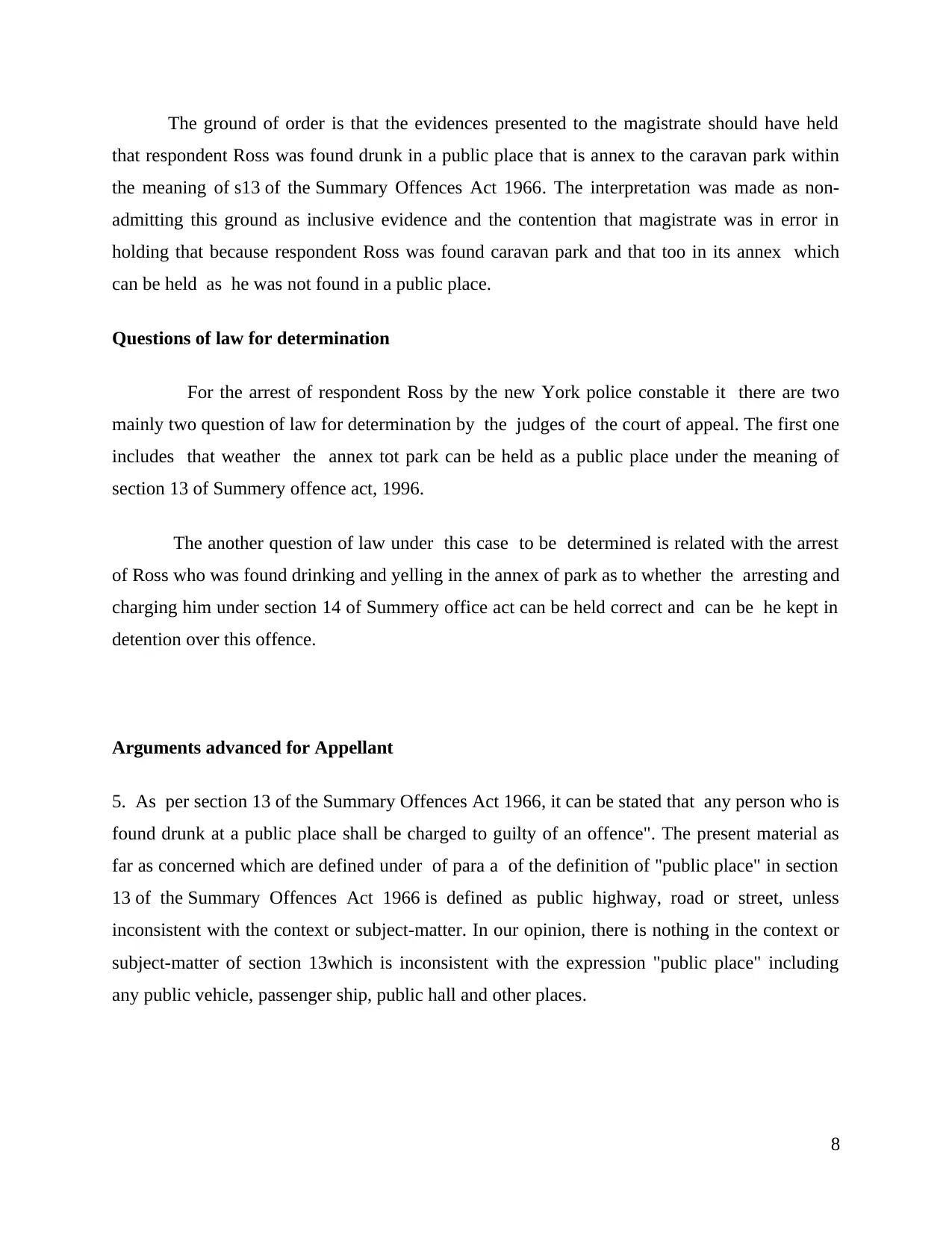
The ground of order is that the evidences presented to the magistrate should have held
that respondent Ross was found drunk in a public place that is annex to the caravan park within
the meaning of s13 of the Summary Offences Act 1966. The interpretation was made as non-
admitting this ground as inclusive evidence and the contention that magistrate was in error in
holding that because respondent Ross was found caravan park and that too in its annex which
can be held as he was not found in a public place.
Questions of law for determination
For the arrest of respondent Ross by the new York police constable it there are two
mainly two question of law for determination by the judges of the court of appeal. The first one
includes that weather the annex tot park can be held as a public place under the meaning of
section 13 of Summery offence act, 1996.
The another question of law under this case to be determined is related with the arrest
of Ross who was found drinking and yelling in the annex of park as to whether the arresting and
charging him under section 14 of Summery office act can be held correct and can be he kept in
detention over this offence.
Arguments advanced for Appellant
5. As per section 13 of the Summary Offences Act 1966, it can be stated that any person who is
found drunk at a public place shall be charged to guilty of an offence". The present material as
far as concerned which are defined under of para a of the definition of "public place" in section
13 of the Summary Offences Act 1966 is defined as public highway, road or street, unless
inconsistent with the context or subject-matter. In our opinion, there is nothing in the context or
subject-matter of section 13which is inconsistent with the expression "public place" including
any public vehicle, passenger ship, public hall and other places.
8
that respondent Ross was found drunk in a public place that is annex to the caravan park within
the meaning of s13 of the Summary Offences Act 1966. The interpretation was made as non-
admitting this ground as inclusive evidence and the contention that magistrate was in error in
holding that because respondent Ross was found caravan park and that too in its annex which
can be held as he was not found in a public place.
Questions of law for determination
For the arrest of respondent Ross by the new York police constable it there are two
mainly two question of law for determination by the judges of the court of appeal. The first one
includes that weather the annex tot park can be held as a public place under the meaning of
section 13 of Summery offence act, 1996.
The another question of law under this case to be determined is related with the arrest
of Ross who was found drinking and yelling in the annex of park as to whether the arresting and
charging him under section 14 of Summery office act can be held correct and can be he kept in
detention over this offence.
Arguments advanced for Appellant
5. As per section 13 of the Summary Offences Act 1966, it can be stated that any person who is
found drunk at a public place shall be charged to guilty of an offence". The present material as
far as concerned which are defined under of para a of the definition of "public place" in section
13 of the Summary Offences Act 1966 is defined as public highway, road or street, unless
inconsistent with the context or subject-matter. In our opinion, there is nothing in the context or
subject-matter of section 13which is inconsistent with the expression "public place" including
any public vehicle, passenger ship, public hall and other places.
8
⊘ This is a preview!⊘
Do you want full access?
Subscribe today to unlock all pages.

Trusted by 1+ million students worldwide
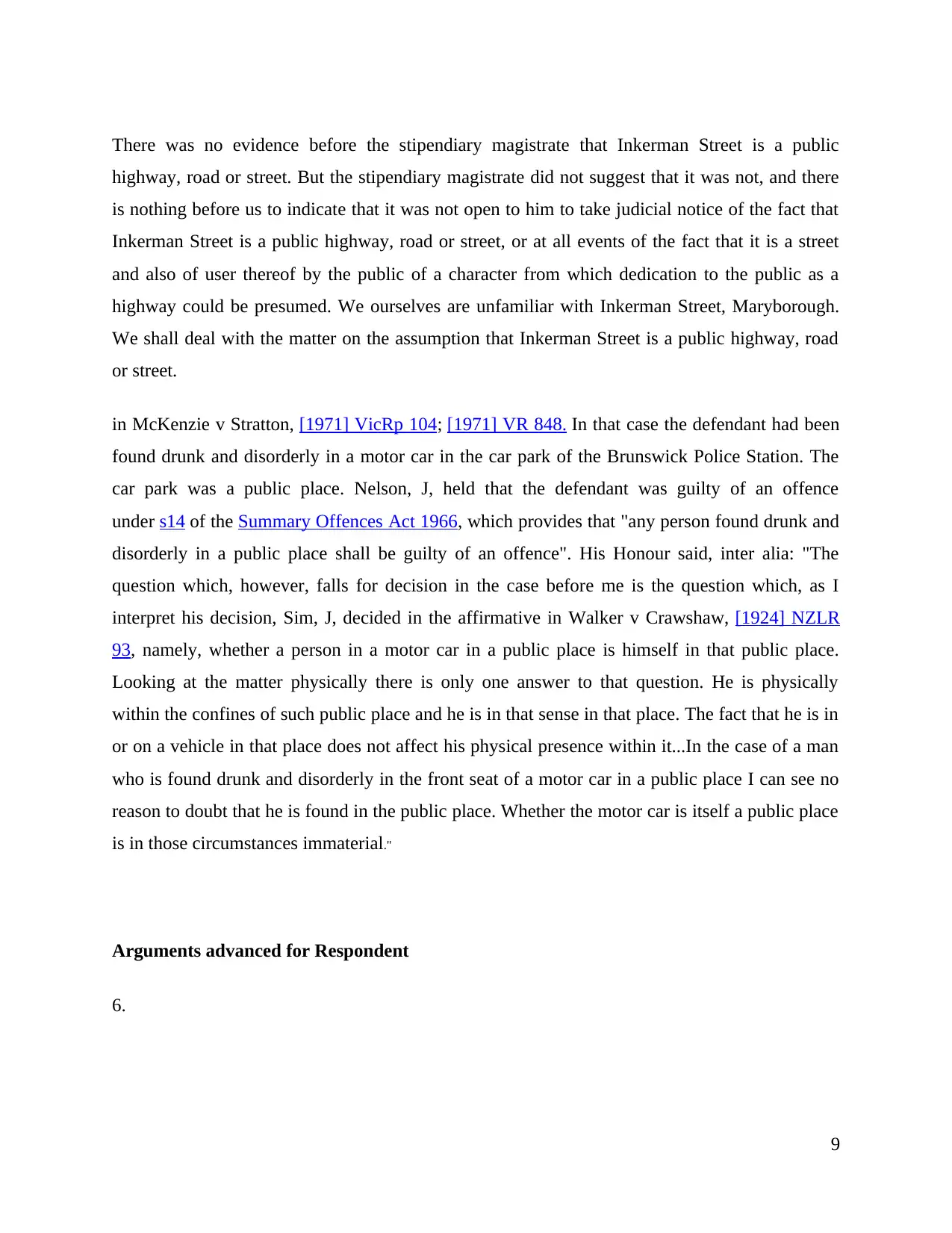
There was no evidence before the stipendiary magistrate that Inkerman Street is a public
highway, road or street. But the stipendiary magistrate did not suggest that it was not, and there
is nothing before us to indicate that it was not open to him to take judicial notice of the fact that
Inkerman Street is a public highway, road or street, or at all events of the fact that it is a street
and also of user thereof by the public of a character from which dedication to the public as a
highway could be presumed. We ourselves are unfamiliar with Inkerman Street, Maryborough.
We shall deal with the matter on the assumption that Inkerman Street is a public highway, road
or street.
in McKenzie v Stratton, [1971] VicRp 104; [1971] VR 848. In that case the defendant had been
found drunk and disorderly in a motor car in the car park of the Brunswick Police Station. The
car park was a public place. Nelson, J, held that the defendant was guilty of an offence
under s14 of the Summary Offences Act 1966, which provides that "any person found drunk and
disorderly in a public place shall be guilty of an offence". His Honour said, inter alia: "The
question which, however, falls for decision in the case before me is the question which, as I
interpret his decision, Sim, J, decided in the affirmative in Walker v Crawshaw, [1924] NZLR
93, namely, whether a person in a motor car in a public place is himself in that public place.
Looking at the matter physically there is only one answer to that question. He is physically
within the confines of such public place and he is in that sense in that place. The fact that he is in
or on a vehicle in that place does not affect his physical presence within it...In the case of a man
who is found drunk and disorderly in the front seat of a motor car in a public place I can see no
reason to doubt that he is found in the public place. Whether the motor car is itself a public place
is in those circumstances immaterial."
Arguments advanced for Respondent
6.
9
highway, road or street. But the stipendiary magistrate did not suggest that it was not, and there
is nothing before us to indicate that it was not open to him to take judicial notice of the fact that
Inkerman Street is a public highway, road or street, or at all events of the fact that it is a street
and also of user thereof by the public of a character from which dedication to the public as a
highway could be presumed. We ourselves are unfamiliar with Inkerman Street, Maryborough.
We shall deal with the matter on the assumption that Inkerman Street is a public highway, road
or street.
in McKenzie v Stratton, [1971] VicRp 104; [1971] VR 848. In that case the defendant had been
found drunk and disorderly in a motor car in the car park of the Brunswick Police Station. The
car park was a public place. Nelson, J, held that the defendant was guilty of an offence
under s14 of the Summary Offences Act 1966, which provides that "any person found drunk and
disorderly in a public place shall be guilty of an offence". His Honour said, inter alia: "The
question which, however, falls for decision in the case before me is the question which, as I
interpret his decision, Sim, J, decided in the affirmative in Walker v Crawshaw, [1924] NZLR
93, namely, whether a person in a motor car in a public place is himself in that public place.
Looking at the matter physically there is only one answer to that question. He is physically
within the confines of such public place and he is in that sense in that place. The fact that he is in
or on a vehicle in that place does not affect his physical presence within it...In the case of a man
who is found drunk and disorderly in the front seat of a motor car in a public place I can see no
reason to doubt that he is found in the public place. Whether the motor car is itself a public place
is in those circumstances immaterial."
Arguments advanced for Respondent
6.
9
Paraphrase This Document
Need a fresh take? Get an instant paraphrase of this document with our AI Paraphraser
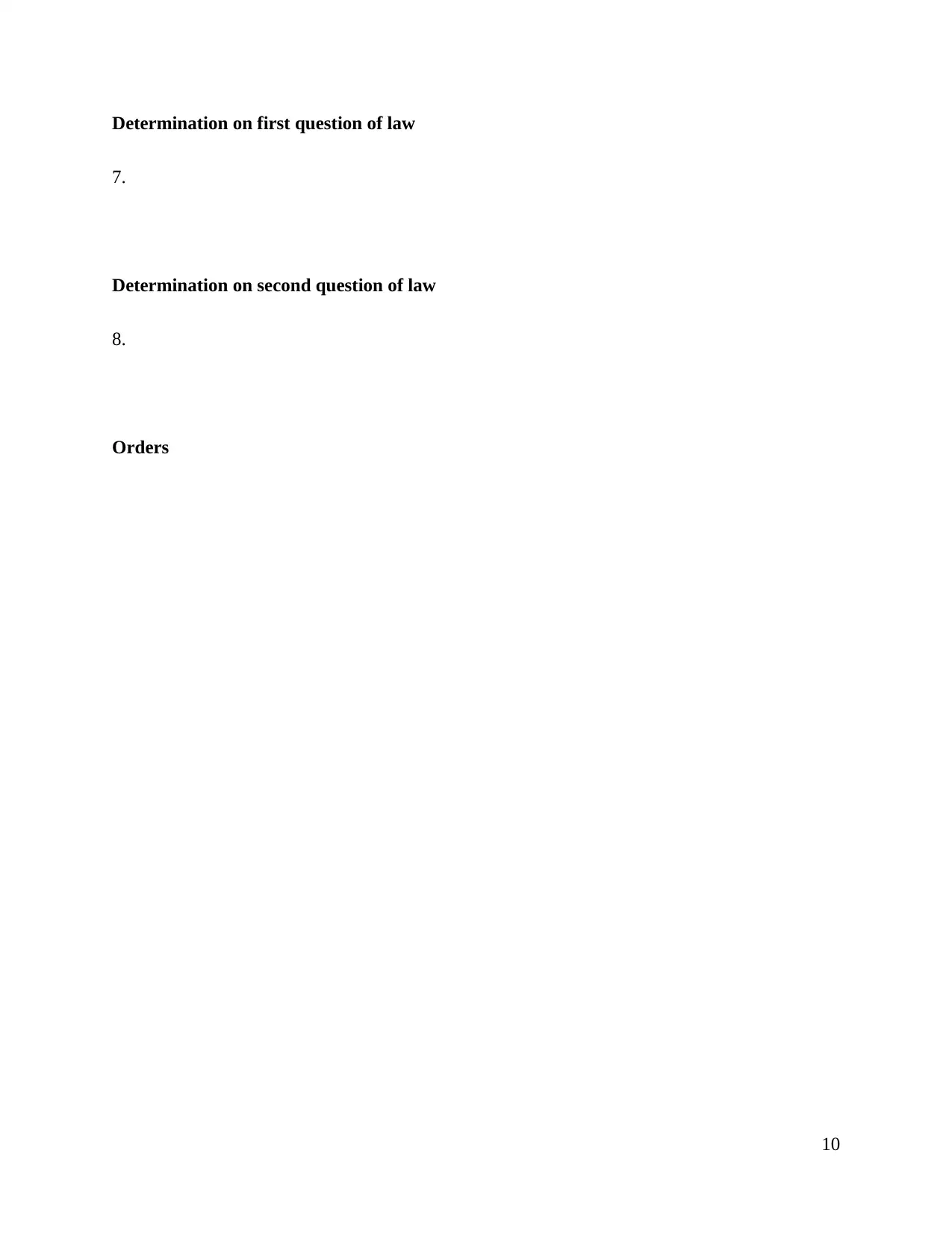
Determination on first question of law
7.
Determination on second question of law
8.
Orders
10
7.
Determination on second question of law
8.
Orders
10

REFERENCES
Books and journals
Online
11
Books and journals
Online
11
⊘ This is a preview!⊘
Do you want full access?
Subscribe today to unlock all pages.

Trusted by 1+ million students worldwide
1 out of 9
Your All-in-One AI-Powered Toolkit for Academic Success.
+13062052269
info@desklib.com
Available 24*7 on WhatsApp / Email
![[object Object]](/_next/static/media/star-bottom.7253800d.svg)
Unlock your academic potential
Copyright © 2020–2026 A2Z Services. All Rights Reserved. Developed and managed by ZUCOL.